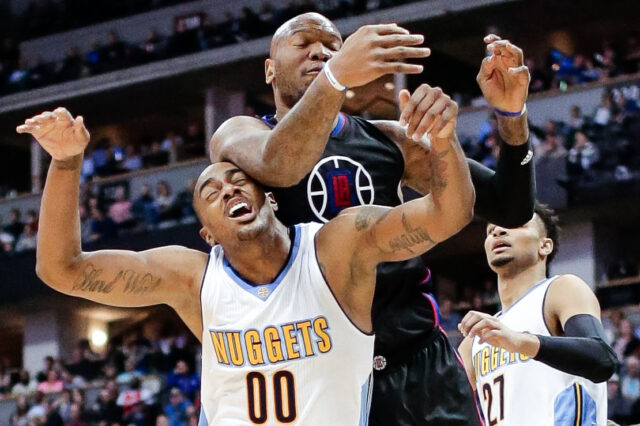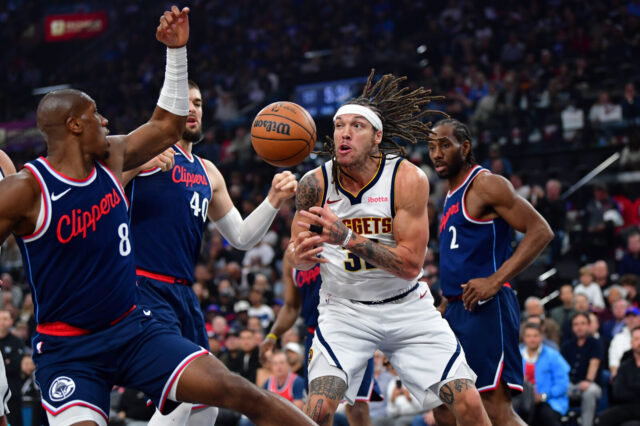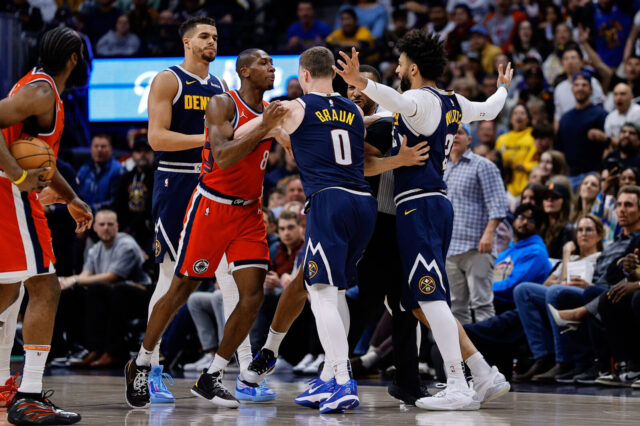Site Manager Ryan Blackburn is beginning a new offseason series that will post every Monday titled “The Climb” which focuses on the journey of the Denver Nuggets during the Michael Malone era. From how the Nuggets recovered from obscurity to how they win their first championship, this will be an open editorial for the next however many months until the new season begins.
The first piece covers Jamal Murray’s ascension to stardom.
To open the 2019 free agency period, the Denver Nuggets wasted no time in offering and agreeing to a max contract extension with point guard Jamal Murray. Former Stiff and current DNVR writer/podcaster/personality Brendan Vogt summed up the move beautifully with this excerpt back on July 1st, 2019:
“This is a real gamble by the Nuggets to commit such a large number to Murray, and it’s up to the 22-year-old to make sure they didn’t just lock themselves into trouble. The Nuggets brass have vocalized their confidence in Murray, and now they’re putting their money where their mouth is with this max deal. Denver will enter a wide open title race, banking on their young core, and their continuity. The pressure is officially on.”
To say Denver’s gamble paid off appears to be selling the Nuggets short. By a lot.
It wasn’t just the winning. It wasn’t just the statistics. Jamal Murray contributed to Denver’s leap as a franchise with a significant leap individually. The player that left the bubble for the Nuggets in late September was a different player than the one that began the season nearly 11 months prior.
“What Jamal Murray did in 19 playoff games from a production standpoint, from an efficiency standpoint, from a consistency standpoint was incredible, but even more so when you [factor] in the emotional leadership that he brought to our team, especially in that first round against Utah. What he did in that Utah series was history in the making almost. It was just so incredible to watch.”
Those were the words Denver Nuggets head coach Michael Malone used last Thursday to describe Jamal Murray in his media exit meeting, who stepped up on the NBA’s biggest stage and put together the most remarkable breakout performance of any player in The Bubble. It wasn’t always sunshine and roses, and the season still ended with the Nuggets falling to the Los Angeles Lakers in five games.
What Murray accomplished in his 19 playoff games superseded any disappointment with failure.
| Season | Minutes | Points | Assists | Rebounds | FG% | 3P% | TS% |
|---|---|---|---|---|---|---|---|
| Regular Season | 32.3 | 18.5 | 4.8 | 4 | 45.6 | 34.6 | 55.9 |
| Playoffs | 39.6 | 26.5 | 6.6 | 4.8 | 50.5 | 45.3 | 62.6 |
From the beginning of the playoffs, it was clear that Murray was doing something he had never done before at the NBA level. Game 1 with the Nuggets in need of a boost in the fourth quarter and overtime, Murray scored or assisted on 31 of Denver’s 39 points in the last 11 total minutes of the game. His dynamic playmaking for himself and others was on full display as he torched Jazz wing Joe Ingles repeatedly down the stretch.
When the Nuggets dropped Games 2 and 3 in ugly fashion, it was Murray who morphed the team’s identity into one of resiliency and poise under pressure.
Murray embodied those ideals for the next three games. Game 4 also resulted in a loss, but Murray scored 50 points, grabbed 11 rebounds, and dished out seven assists with zero turnovers in a masterful performance. The Nuggets couldn’t get enough stops to win which dropped the Nuggets down 3-1 in the series, but that didn’t stop Murray from continuing an incredible offensive onslaught in Game 5. He had 42 points, eight assists, eight rebounds, and zero turnovers in a win to prevent elimination. In Game 6, he prevented elimination again, this time with 50 points on just 24 field goal attempts, joining Hall of Famer Bob Cousy as the only two players in NBA playoff history to have 50+ points on 25 or fewer shot attempts. Cousy attempted 32 free throws in his performance while Murray attempted just nine.
But it was Murray’s postgame interview that stole the show for all the right reasons. After managing heartbreak and high levels of emotion stemming from the shooting of Jacob Blake in Kenosha, Wisconsin, Murray had this to say about his performance in Game 6:
Murray went through a lot in the playoffs, especially in that Utah series. To come out the other side of it as Denver’s clear emotional leader with the poise and maturity to perform in an abnormal setting was a gutsy as it gets. If Murray had stopped after the Nuggets came back from down 3-1 against the Jazz to win Game 7, then he would already be a star.
But he didn’t stop there.
“To see him carry that through another seven game series and then into the Western Conference Finals, it was just [great to] witness up close and personal the growth of a young superstar.” -Michael Malone on Jamal Murray
The next series was against the Los Angeles Clippers. As strenuous as his burden was against Utah and having to put up 142 combined points in three games to keep the Nuggets alive, the test from the Clippers was even more difficult. Kawhi Leonard, Paul George, and Patrick Beverley were to take turns being as physical and difficult against Murray as they could possibly be, and while Royce O’Neale was a solid defender in the first round, this was a different level.
It took Murray a few games to get accustomed to having the kitchen sink thrown at him by defenders with 14 All-Defensive team nods between them, but in in Games 5, 6, and 7, Murray averaged 29.3 points and 5.7 assists while shooting 51.6% from the field and 54.5% from three-point range. Those were three Denver wins in which the Clippers couldn’t stop Murray, and once Murray broke out, the Clippers broke completely. Murray finished off the fraudulent contender with 40 points in Game 7 on 15-of-26 from the field, hitting a legitimate dagger over Kawhi Leonard that pierced the hearts of television executives everywhere hoping for an All-Los Angeles Western Conference Finals.
If Murray was done there, it would have been one of the best individual performances in Nuggets playoff history, if not the best.
He wasn’t done.
In Denver’s final series against the Lakers, Nikola Jokić was at a major matchup disadvantage dealing with the size and physicality (and subsequent foul trouble) that Anthony Davis, Dwight Howard, and LeBron James brought every single night. Murray would have to step up and be at his best every single night, and for the most part, he accomplished just that. During the series, he averaged 25.0 points and 7.4 assists on 51.8% from the field and 31.0% from three-point range. It was revealed in Game 5 that Murray was laboring through a bone bruise in his knee, but that didn’t stop him from putting up great numbers showcasing just how elite he was on the biggest stages.
The Western Conference Finals was Murray’s arrival party. He may not have won the battle with LeBron James, who proved he was the best player in the world in the final game of that series, but he proved he could hang with the best of the best. The numbers and incredible highlights and key moments speak for themselves.
Malone had more to say about Murray in his exit interview last Thursday:
“To see him carry that through another seven game series and then into the Western Conference Finals was just [great to] witness up close and personal the growth of a young superstar.”
This content is no longer available.
How Murray’s ascension impacts “The Climb”
Just in case you skipped the blurb at the top, “The Climb” refers to Denver’s journey from when Michael Malone first began coaching the Nuggets and how they can ascend to become NBA champions. The most straightforward way to become a champion? Acquire stars.
Malone had more to say about the Nikola Jokić and Jamal Murray duo in his exit interview:
“Last year after 14 playoff games, I think everybody around the world noticed the greatness of Nikola Jokić because he had played well in the regular season, but that only takes you to a certain point. When you can do that on the biggest stage, in the playoffs through two Game 7’s, I think that put Nikola in a different light.
“Jamal, on the other hand, he had a good playoffs, but there were some inconsistencies. There were still some questions about ‘okay, we know Nikola is at this level, but when is Jamal going to get there?’”
Malone continued:
“I think just like the Lakers have a two star attack, the Clippers have a two star attack, we have a two superstar attack as well in Nikola and Jamal. That gives us that much more confidence going forward because we’re a team that was built organically from within.”
The Lakers are likely going to win the 2020 NBA Championship with LeBron James and Anthony Davis leading the way. There have been other players contributing along the way, but James and Davis have been driving that bus together for the entire season.
The Clippers duo of Leonard and George didn’t rise to the occasion in the playoffs, but they were projected as one of the top duos throughout the 2019-20 season.
The Miami Heat, LAL’s NBA Finals opponent, had the best playoff duo in the Eastern Conference by far in Jimmy Butler and Bam Adebayo.
Before this season, the Nuggets were a one-man show with an excellent side act in Jokic and Murray respectively. Murray of course had some moments in the 2019 playoffs, which is why the Nuggets put their faith into him in the offseason with a max contract extension. The following regular season did little to sway Murray’s doubters however, and for good reason. While Murray made incremental improvements in different areas, the overall impact was jarringly similar and disappointed many.
This content is no longer available.
This postseason changed everything for Murray and the Nuggets. He and the organization both saw exactly what he could do, what he’s capable of when challenged in a playoff setting. Against all odds, with their backs against the wall, the Nuggets found out they could count on their young stars to be one of the most dynamic duos in the entire NBA. It wasn’t just Jokić making plays or Murray hitting open shots, but rather a comprehensive shot profile based on added weight, strength, explosiveness, and control to Murray’s overall game. Instead of settling for long jumpers, Murray consistently forced the issue by attacking the paint to open up shot windows for himself and those around him. That opened up constant opportunities for Murray to showcase a lethal outside jumper.
Now, instead of the Nuggets having to seek out a legitimate second star to pair with Jokić, they can feel comfortable with Murray shouldering that burden and expecting positive results going forward. Often, the Nuggets have been surrounded by trade rumors for disgruntled stars like Bradley Beal, Kyrie Irving, Butler, George, and others. Their willingness to be patient and wait to see what Murray could become looks to have paid off in some regard.
It has also allowed Denver to be more careful about the other players they will invest in going forward. Denver discovered that rookie Michael Porter Jr. and Jerami Grant were both excellent fits next to Jokić and Murray due to their combination of athleticism, skill level, perimeter shooting, and complementary defensive skills (Grant’s on-ball defense and Porter’s rebounding). Those two are about as great of fits as any forward in the NBA outside of unobtainable star talent.
Climbing to the top of the mountain in Denver used to start and stop with Jokić and his ascendance to new heights. Now, it’s almost more matchup based as to whether Murray or Jokić will be the most important player in a series. With Jokić facing Rudy Gobert in the first round, Murray covered for him and dominated consistently. With Murray facing Kawhi and a bunch of other elite defenders, Jokć stepped up to the challenge to get the Nuggets to a Game 7 at which point Murray dropped 40 points to close out an elite team. In the Conference Finals, Jokić was always going to struggle with LAL’s combination of length, physicality, athleticism, and defensive intelligence, so Murray stepped up and averaged 25 and 7 for the series.
Murray has officially forced his way into the discussion for Denver’s identity. It’s no longer Jokić’s team, but rather Jokić AND Murray’s team. They are in this together and will control Denver’s ultimate destiny as a championship contender.
If the 2020 playoffs are any indication, Murray is more than up to the task.


